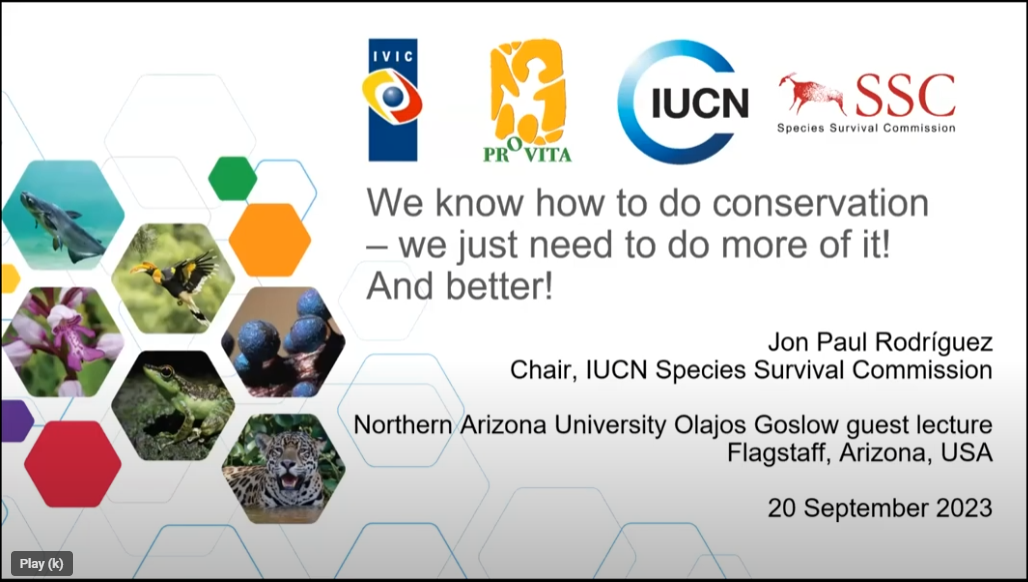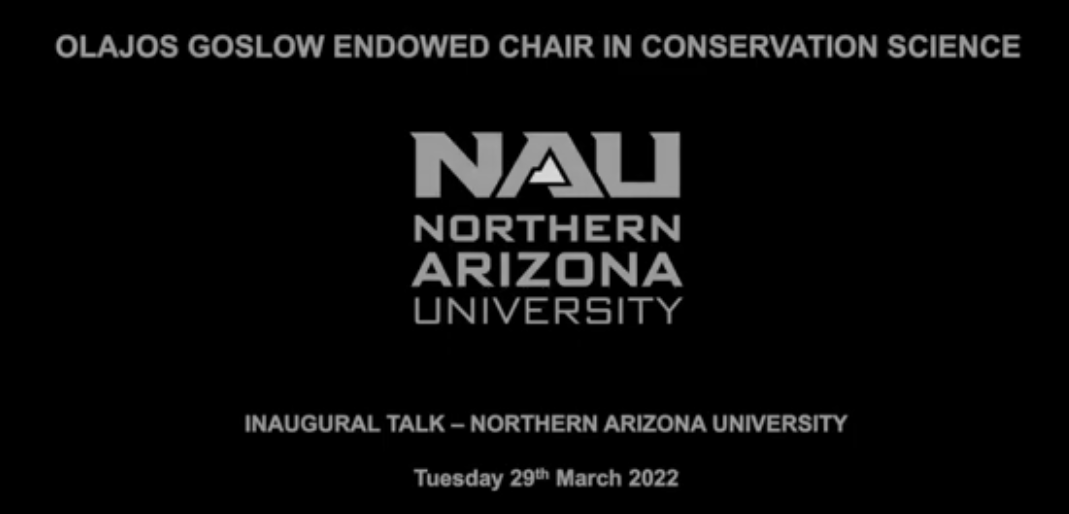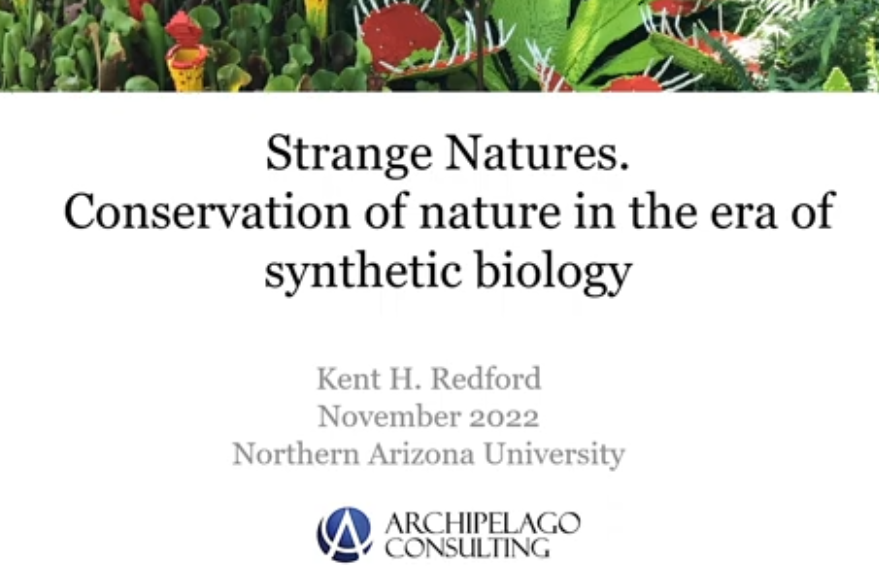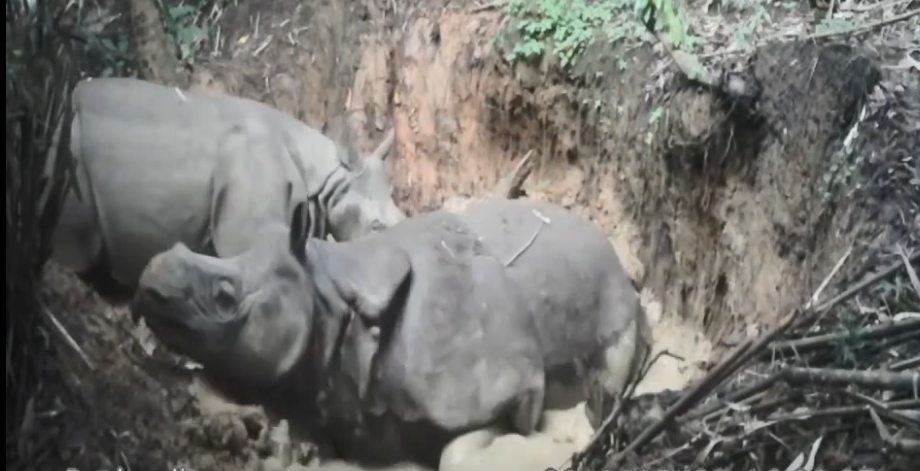
MEDIA AND PUBLICATIONS


SELECTED SEMINARS AND PRESENTATIONS
-

Resilient Conservation Lab Graduate Student Symposium on Inclusive Conservation (2024)
Northern Arizona University's Olajos-Goslow Chair for Environmental Science & Policy Graduate Student Symposium on Inclusive Conservation. November 7, 2024, at Northern Arizona University.
-

Sisk Fellowship at NAU
The purpose of the Thomas D Sisk graduate fellowship is to recruit and support the next generation of conservation leaders who mirror the diverse demographics of the communities of the US Southwest. In addition, the Fellowship aims to ensure the continuation of conservation work bridging disciplinary divides, and the divides between academia and other conservation stakeholders, by strengthening partnerships between NAU and other conservation organizations.
-

We know how to do conservation -- we just need to do more of it! And better! (2023)
Northern Arizona University's Olajos-Goslow Chair hosted guest lecture by Dr. Jon Paul Rodríguez, IUCN Species Survival Commission Chair, “We know how to do conservation -- we just need to do more of it! And better!”
-

Plenary Talk: Navigating Conflict and the Sustainable Use of Wildlife (2023)
Professor Biggs discusses the global challenges of wildlife conservation, the economic inequalities that exist in conservation landscapes of interest, and some of the solutions that exist to remedy human-wildlife conflict.
-

Baboons: The Monkey that People Love to Hate (2023)
Professor Strum talks about her groundbreaking research on baboons in East Africa from the last half century and also discusses the link between people, primates, and technology in the 21st century.
-

Strategic Action Plan for Large Carnivore Conservation in Uganda (2023)
On the 8-10 May 2023 NAU co-funded the consultative workshop on the development of the new Ugandan Carnivore Action Plan. Representatives attended from Ugandan Wildlife Authority, Wildlife Conservation Society, World Wildlife Fund, Makerere University and many other private and not-for-profit organizations. Insights were provided into the major threats and potential solutions for African lions and other carnivores in Uganda. Film by Rolling Label.
-

Olajos Goslow Chair Inaugural Lecture at NAU School of Earth and Sustainability (2022)
Professor Biggs delivers his first lecture on his experiences working in African and Asia Pacific conservation. He also lays out a roadmap for his new position as the Olajos Goslow Chair in Environmental Science.
-

We Alone: How humans have conquered the planet and can also save it (2022)
A lecture by David Western, chairman of the African Conservation Center in Nairobi, Kenya. He began research into savannas ecosystems at Amboseli National Park in 1967, looking at the interactions of humans and wildlife. In this talk David talks about the challenges of conservation in the 21st century, how we can solve environmental problems and the importance of community-based conservation.
-

Tree-Climbing Lions (2022)
Resilient Conservation Lab member Alex Braczkowski filmed this television show which tracks the journey of doing the most accurate count to date of African lions in Uganda. But the lions in this part of Africa are not ordinary lions; they climb 40-foot tall fig trees and cactus-like euphorbias.
-

Strange Natures: Conservation of Nature in the era of synthetic biology (2022)
Kent Redford talks about the era of synthetic biology and journey as a conservationist. Kent Redford is Principal at Archipelago Consulting.
-

The role of conservation and conservationists in a COVID 19 world (2021)
Dr Biggs discusses conservation in a post COVID-19 world. He examines the immense inequalities that the pandemic has revealed (in both access to healthcare and access to resources) and the need for research into resilience in the natural resource sector.
-

Factors shaping the conservation of the Critically Endangered Javan Rhinoceros (2020)
Resilient Conservation Lab member Steve Wilson discusses the ecology, behaviour and communication of the critically endangered Javan rhinoceros.
-

Shutting down wet markets (2020)
Duan Biggs speaks to Peter Stefanovic on Sky News Australia about the roles wet markets play and how shutting them down might be counterintuitive to achieving best health results. Without considering human livelihoods and the diverse values held by stakeholders an outright ban of these markets is unlikely to work.
-

Navigating Conflicts over Iconic Wildlife (2020)
In a first of its kind human wildlife conflict workshop, a diverse array of conservation stakeholders got together in Namibia to share their approaches to solve complex conflicts over iconic wildlife. This was a collaboration amongst local governments, the Luc Hoffmann Institute, Namibia Nature Foundation and Griffith University.


SELECTED REPORTS
-

Report: The State of Knowledge and Practice on Human-Wildlife Conflicts (2020)
Human-wildlife conflict (HWC) is complex. Conflicts are fundamentally social and political issues between people, but the language of conflict is often associated with negative interactions between wild animals and people. This new report addresses fundamental governance questions and uses existing research to advise on the factors to consider and the potential design for a new standard.
-

Malawaian Bushmeat Project Final Report (2020)
The final results and recommendations led by Julia Van Velden on bushmeat prevalence in Malawi. This collaboration between Griffith University and Lilongwe University of Agriculture and Natural Resources brings some of the most important results on the current status of bushmeat use in Malawi and a series of socioeconomic solutions to enable conservation.
-

Report: Zoonotic Disease Risk (2022)
Resilient Conservation group members work with TRAFFIC to assess how supply chain management and traceability tools could be adapted to wild animal trade chains. This could be done in order to reduce zoonotic disease risks and also to ascertain what level of monitoring would be needed for legal wild animal trade to be considered safe and sustainable. Surveillance and adaptable management are critical to avoid the next outbreak.
-

Developing Innovative Financial Instruments for direct benefits to communities around Key Biodiversity Areas with a focus on Great Apes (2024)
A Scoping Report for UNEP GRASP

KEY PUBLICATIONS
Social-ecological systems / human wildlife co-existence
Clerici, N., Armenteras, D., Kareiva, P., Botero, R., Ramírez-Delgado, J. P., Forero-Medina, G., Gómez, C, Linares, M., Hirshiki, C. & Biggs, D. (2020) Deforestation in Colombian protected areas increased during post-conflict periods. Scientific reports, 10(1), 1-10. https://doi.org/10.1038/s41598-020-61861-y
Bodin, O., Alexander, S., Baggio, J., Barnes, M., Berardo, R., Cumming, G., Dee, L., et al. Gerrero, A. (2019). Improving network approaches to the study of complex social–ecological interdependencies. Nature Sustainability, 2, 551-559. https://doi.org/10.1038/s41893-019-0308-0.
Biggs, R., Schlüter, M., Biggs, D., Bohensky, E., BurnSilver, S., Cundill, G., Dakos, V., et al. (2012). Toward principles for enhancing the resilience of ecosystem services. Annual Review of Environment and Resources, 37, 421-448. https://doi.org/10.1146/annurev-environ-051211-123836.
Human impact on ecosystems
Jones, K. R., Venter, O., Fuller, R. A., Allan, J. R., Maxwell, S. L., Negret, P. J., & Watson, J. E. (2018). One-third of global protected land is under intense human pressure. Science, 360(6390), 788-791. https://doi.org/10.1126/science.aap9565.
Venter, O., Sanderson, E. W., Magrach, A., Allan, J. R., Beher, J., Jones, K. R., ... & Watson, J. E. (2016). Sixteen years of change in the global terrestrial human footprint and implications for biodiversity conservation. Nature communications, 7(1), 12558. https://doi.org/10.1038/ncomms12558
Moore, M., Tjornbo, O., Enfors, E., Knapp, C., Hodbod, J., Baggio, J., Norstrom, A., et al., Biggs, D. (2014) Studying the complexity of change: toward an analytical framework for understanding deliberate social-ecological transformations. Ecology and Society 19(4): 54. http://dx.doi.org/10.5751./ES-06966-190454.
Conservation and tourism
Biggs D., Hall, C., Stoeckl, N. (2012). The resilience of formal and informal tourism enterprises to disasters – the case of reef tourism in Phuket. Journal for Sustainable Tourism 20: 645-665. https://doi.org/10.1080/09669582.2011.630080.